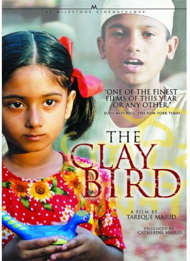| Release List | Reviews | Price Search | Shop | Newsletter | Forum | DVD Giveaways | Blu-Ray/ HD DVD | Advertise |
| Reviews & Columns |
|
Reviews DVD TV on DVD Blu-ray International DVDs Theatrical Reviews by Studio Video Games Features Collector Series DVDs Easter Egg Database Interviews DVD Talk TV DVD Talk Radio Feature Articles Columns Anime Talk DVD Savant HD Talk Horror DVDs Silent DVD
|
DVD Talk Forum |
|
|
| Resources |
|
DVD Price Search Customer Service #'s RCE Info Links |
|
Columns
|
 |
The Clay Bird
|
||||
The beautiful The Clay Bird, a co-production between France and Bangladesh, is a period reconstruction of rural life at the beginning of the Bangladesh Liberation War in 1971. Director Tareque Masud presents a rich dramatization of the experiences of one family dominated by a devout Muslim father. While his counsel and that of the local authorities preach that faith will sustain all through hardships, the family learns otherwise, the hard way. The story focuses on the young son sent away to religious school. The main thematic conflict pits the limitations of small-village tradition against a more complex and contradictory reality. We are soon quite concerned for Masud's unsentimental characters.
Ethnographic films seem to improve considerably when the filmmakers are from the cultures being portrayed. Tareque Masud was himself sent to a Madrasah (an orthodox boarding school for boys) and remembers the shock of learning that it did not represent the real world. The complex portrait of Bangladesh offered in The Clay Bird is due to the filmmakers' experience across political and religious lines: One actor is a Hindu playing a Muslim and another a Muslim playing a Hindu. Several languages are spoken in the film, and even the schoolboys are expected to learn Farsi and Arabic in addition to their local Bengali language. Young Anu's experience is similar to that of any child being raised in orthodox surroundings. The humorless Kazi forbids his children to enjoy the local Hindu music and games. Anu is sent off to school to remove him from the 'corrupting' influence of his own uncle, the progressive Milon. Younger sister Asma is forbidden to play outside. When Milon gives her a little clay bird, the only brightly colored thing she owns, she must hide it. The film wins us over to its point of view on the orthodox life not by preaching but by showing Anu's family coping with the contradictions in their lifestyle. Kazi and his orthodox friends comfort each other with the certainty that their beliefs are just, even as they reject all things of the outside world including modern medicine. Ayesha feels betrayed by her husband's devotion to Allah and its rules that prevent her from taking proper care of her sick daughter. Ayesha is not even granted a full personal identity. Kazi addresses her not by her own name, but as the "mother of Anu." Kazi's paternal wisdom is assumed to prevail in all things. When Asma falls sick, Milon sneaks some medicine to help the child deal with a fever. Kazi rejects it, saying that it will interfere with his homeopathic cures. At school Anu is given a Muslim name and witnesses cruelties to his best friend Rokon. Driven half-mad by buzzing in his ears, Rokon is sent into the cold river to dunk himself 101 times, a ritual meant to exorcise the demon in his mind. And this is 1970, not the middle ages. Minon's awareness of political events and his Western mode of dress make him an outsider in a community where sanctioned musicians sing songs about ignoring outside influences and placing all faith in Allah. News reaches the village that the Pakistani Army is burning villages and shooting people at random, but Kazi refuses to give the warnings credence. The Clay Bird has no scenes of violence and observes the terror of a civil war through the eyes of innocent citizens. It shows the villagers as intelligent people and not ignorant peasants, but clearly indicates that tradition and religious inflexibility make them easy victims of outside forces and their own illusions. It has no villains. Kazi is a thoughtful and caring man. Milestone and New Yorker's The Clay Bird is a strikingly beautiful enhanced transfer of this carefully filmed show. Bangladesh is presented as a lived-in and livable place. The period reconstruction is a clear labor of love. The production went to great lengths to find vehicles and boats from 1970. The movie makes intelligent use of indigenous music, much of which is offered by folk singers and balladeers. All the songs seem to have a moral or religious purpose. The disc has several welcome extras. A 30-minute docu watches Tareque and Catherine Masud going through production videotape to explain the difficulties of filming in a place with such unpredictable weather. We share their finding of the perfect locations and their efforts to cover up modern architecture and remove things like satellite dishes from their locations. A lengthy set of interviews brings us in closer contact with the cast members, a fascinating and diverse group of actors. Four year later, the boys that play Anu and Rokon already look like adults. The Masuds are also interviewed and are quick to praise the local cooperation given them during filming. A still section, two trailers and an audio presentation of three uncut songs from the soundtrack are also included.
On a scale of Excellent, Good, Fair, and Poor,
The Clay bird rates:
Review Staff | About DVD Talk | Newsletter Subscribe | Join DVD Talk Forum |
|
| Release List | Reviews | Price Search | Shop | SUBSCRIBE | Forum | DVD Giveaways | Blu-Ray/ HD DVD | Advertise |






